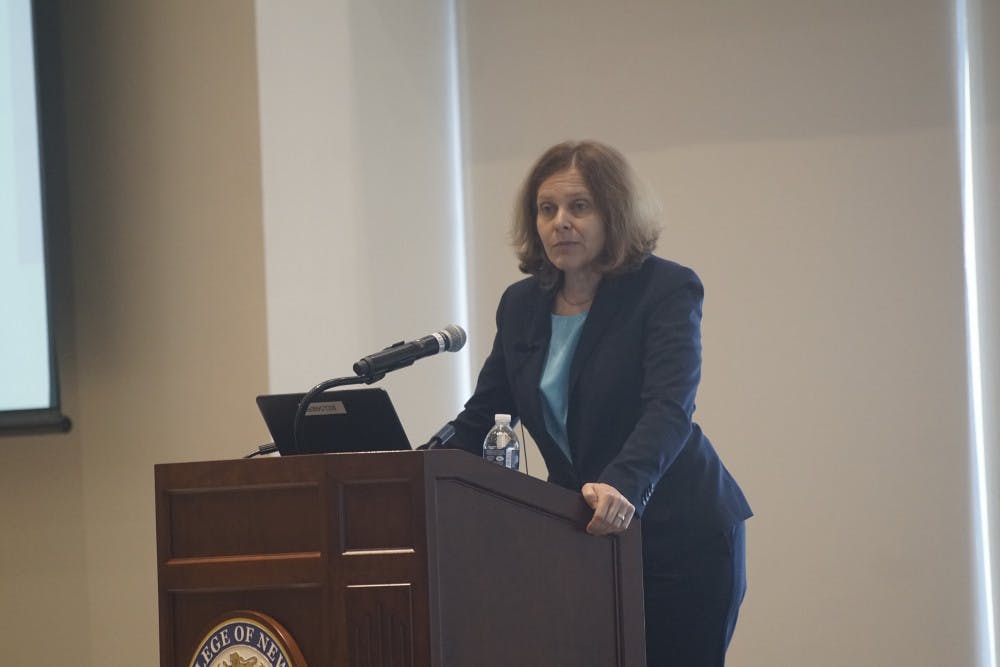By Kelyn Chen
Correspondent
The College honored Constitution Day with a presentation titled “Inclusive Freedom: The Quest for a Democratic Culture” in the Brower Student Center Room 100 on Sept. 17.
Sigal Ben-Porath, a University of Pennsylvania professor and author of the book Free Speech on Campus, offered her insight on safe spaces, political correctness, the significance of the First Amendment and the counter-protest against conservative religious group Bible Believers in Alumni Grove last April.
Ben-Porath discussed the history of free speech censorship in higher education, and argued that the Tinker v. Des Moines (1969) court case was the highest water mark of permitting free speech in schools. She mentioned that despite the Supreme Court decision, courts have repeatedly hindered free speech at public high schools.
According to Ben-Porath, schools like Hazelwood East High School in Missouri have argued that student newspapers are not welcome to free press in order to protect a productive student society.

Ben-Porath suggested that media representation of college campuses through shows like “Tucker Carlson Tonight” put everyday college life under a spotlight by constantly reporting and criticizing student protest and language. In the digital age, any controversial language is immediately recorded and distributed, making it incredibly difficult for students to engage in an honest and open conversation.
She then spoke about the government crackdown of free speech on college campuses. Bills passed by state legislature and the justice department in Arizona, Wisconsin and Ohio have already threatened to expel any student found inhibiting the free speech of another. The University of Wisconsin recently adopted a policy to expel any student after the third infraction, according to Ben-Porath.
Throughout the lecture, Ben-Porath repeatedly articulated three core goals for colleges to achieve. She stated that colleges should proliferate the search for knowledge, educate students and mold students into future citizens of a democracy.
Ultimately, the First Amendment allows college students to have meaningful conversations, according to Ben-Porath.
“It’s a recipe for concern,” Ben-Porath said. “The First Amendment protects a citizen’s freedom of speech, but some states have forgotten that, although public institutions like state colleges are a product of the government. A campus is a unique context in which we need separate rules beyond the legal ones … to promote our (educational) mission.”
Ben-Porath then spoke about the impact of student protests.
Junior philosophy major Nicholas Cernera asked how a sign in the beginning of the presentation saying, “No Dialogue with White Supremacy” added to her presentation.
According to Ben-Porath, the sign was from a student protest affiliated with Black Lives Matter at the College of William and Mary against a guest speaker from American Civil Liberties Union. She responded to Cernera by pointing out how the student protest did not contribute to diversity on campus.
“I think that the actions of the students at William and Mary were misguided actions that expressed appropriate values for this campus,” Ben-Porath said. “They are saying that ‘Hey, here is this speaker coming to talk to the law school from ACLU. We abhor the march in Charlottesville (last summer), and so we are going to chase the person out of campus.’”
Ben-Porath said that colleges must recognize and accept free speech, especially in student organizations based on personal identity.
“There should not be “speech for speech sake,’” she said. “Our goal is protecting open expression. Inclusive freedom means educational and relational freedoms, not only legal. This does not mean ‘snowflakes and safe spaces.’ Campuses should be a safe space in the dignitary sense, not the intellectual.”
Ben-Porath explained how UPenn tries to protect the right to free speech for opposing groups. She describes an initiative there called “free speech observers,” who are professors or upperclassmen trained in conflict resolution that oversee events and ensure that students are respectable.
Ben-Porath recalled a past situation in which UPenn dealt with a similar group to the Bible Believers, who were on public property adjacent to the school. UPenn students did not react violently and provided an alternative focus, such as raising signs supporting LGBTQ+ groups or throwing pride events just across the street.
Ben-Porath concluded her presentation by emphasizing that professors should expose students to a diverse viewpoints for future encounters in the academic world. She uses the Flat Earth Society as an example of a different opinion.
“Exposing my students to an educational matter, to the argument from different sides and how you may be able to confront them or refute them,” Ben-Porath said. “I think it’s quite interesting and quite productive from an educational standpoint. If you’re going to be a climate scientist, you need to be able to respond to that.”
She encouraged professors to address and acknowledge controversial topics within their lesson plans to facilitate discussion, and she further reiterated the responsibility of the instructor to uphold intellectual honesty.
“What good does it do for me to silence a student? I do not want to give a speaker a platform to promote a view that I see as false, as contradicting the point of facts,” Ben-Porath said.







